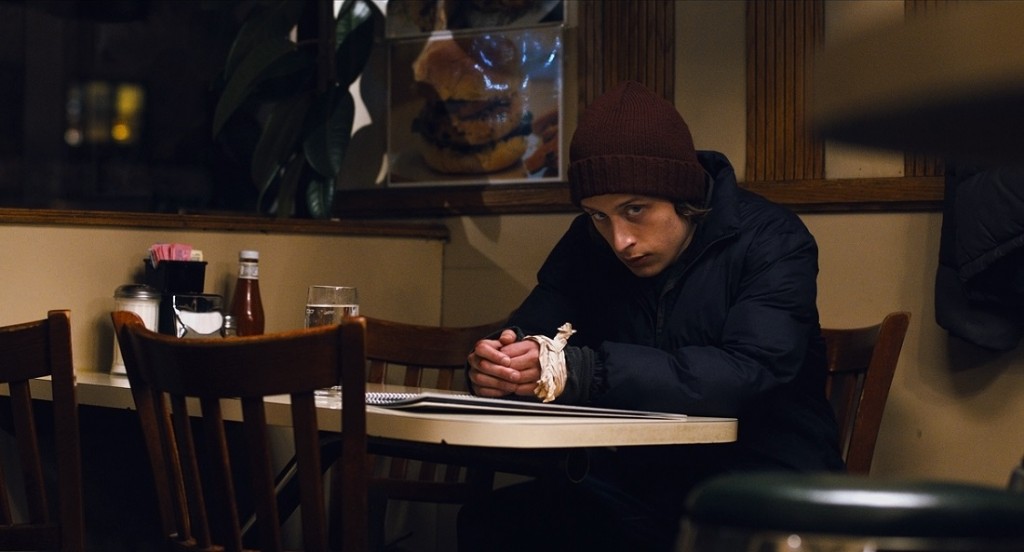Tribeca Reviews: ‘Gabriel’ — A Polarizing Portrait of Mental Brinkmanship

Rory Culkin in “Gabriel.” Photo Courtesy of: Gabriel/TFF14.
A barren tree, alone in a field, its leafless branches clawing at a gray midwinter sky, dominates the opening shot of Lou Howe’s Gabriel with its barky bulk. The visual speaks perfectly to the film’s dreary narrative and the solitary plight of its title character, a conflicted young man trying to grapple with a mental illness that threatens to give him a hard shove over the tipping point.
Writer-director Howe, in his feature-length debut (and an insanely fine one at that), isn’t concerned with a One Flew Over the Cuckoo’s Nest perspective of an asylum’s interior; rather, his story’s embarkation point is Gabriel’s return home from an extended stay in a mental-health facility and his go at life on the outside. While the multi-hyphenate’s script doesn’t publicize the 20-something’s exact diagnosis, it’s apparent from the outset that Gabe (a brilliant Rory Culkin) is depressive and unstable. Wildly erratic, he punches walls in frustrated outbursts, steals valuables from his grandmother in an attempt to pay for a steep cab fare, and gouges the palm of his hand with a knife in emo-fraught impulsiveness. In one particularly deranged scene, Gabe pretends to slit his throat while in the company of his mother (Deirdre O’Connell), an adoring but smothering woman, and Matt (David Call), a mocking embodiment of normalcy and success. Where the matriarch envisions a medicated staycation for her son, he has an entirely different get-better-soon scheme: rekindling a relationship with a childhood ex-love, Alice (Emily Meade), who he believes holds the magical elixir to calming his cerebral strife. It’s an unshakable obsession around which Gabe’s universe spins, a Blanche DuBois-esque fantasy of high-flung idealism that shapes his every action up until an emotionally turbulent finale.
Howe firmly, and boldly, plants his flag in the directorial turf with this freshman effort. There’s plenty to love in Gabriel, but the principal triumph in his indie coming-out stems from a nuanced character study that both delicately exposes Gabriel’s vulnerability and skillfully peels back his layers bit by bit. And what do we get? A complex portrait of a highly polarizing personality bound to inspire both sympathy and scorn. Howe communicates the misunderstood nature of his character in one of the first exchanges of the film, when a mother misconstrues Gabriel’s sincere efforts to make her child laugh as something more perverted. And because the quasi-protagonist is integral to every scene in the movie, we essentially see the action unfold from his perspective, making his failed grasps for mental stability all the more tragic. Accolades must, of course, go to Culkin, who navigates the peaks and troughs of this psychological roller-coaster ride with an adept sensitivity. (Howe’s restraint and distanced direction only serve to highlight Culkin’s chops.)
Along with a story heavily skewed toward one personage comes the risk of a glazed-over approach to the subsidiaries, and Howe unfortunately gets caught in the snare. Gabe’s mother and brother are underdeveloped and lacking in substance, seemingly existing for the sole reason of throwing up roadblocks to his independence (in the case of the former) or as a stark reminder of everything the struggling lad isn’t (in the case of the latter). O’Connell breaks free from her unidimensional rut in an especially arresting bedside dialogue volley that demonstrates the upper limits of her motherly affection, whereas Call’s Matt falls more along the lines of even-keel boredom.
Gabriel isn’t exactly brimming with physical action (unless you’d count the misfiring of some of Gabriel’s synapses) but it’s a far cry from being a tranquil picture. Howe piles on tension throughout, oftentimes unsettling the nerves with the simplest of devices. The camera frame slowly tightening around the whirring blades of a ceiling fan, the spinning planks growing threateningly sonorous and driving Gabe to near madness, comes immediately to mind. Indeed, Howe says he sought to create an experience more through the sound than the visuals, and long periods of silence interspersed with an abstract score of frantic strings (courtesy of composer Patrick Higgins) in more excitable moments leaves us on unstable footing. And cinematographer Wyatt Garfield’s palely colored shots of the chill Long Island landscape and unwelcoming streets of Manhattan serve to cloud it all in a downcast mood.
Ultimately, because Howe’s story is much more scaled down and domestic than other chronicles of psychological disorders like Shutter Island and A Beautiful Mind, it hits much closer to home than Teddy Daniels’ amnesic criminal cover-up or John Nash’s conspiracy-theorizing delusions. Grounded in the desperate pursuit of reciprocated love, the director’s feature foray strikes a universal nerve and delivers a unique, though unsettling, take on a mentally ill individual trying desperately not to be smothered by his inner demons.
Rating: 3.5 out of 4 stars
Video courtesy of WeLiveFilmFestivals.
